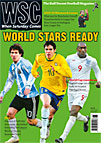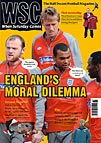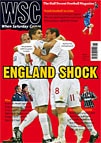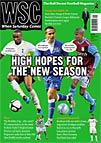 Adam Bate believes getting the press onside is an important skill for any football figure, but they don’t all seem to realise this
Adam Bate believes getting the press onside is an important skill for any football figure, but they don’t all seem to realise this
“I wasn’t a great communicator. Things are different now because I’m trying to get into media work, but I didn’t speak to the press then and that maybe didn’t help my cause. The thing is that at Blackburn and West Ham, my performances were OK and spoke for themselves, but that wasn’t the case here [at Fulham].” Ian Pearce, 2011.
Pearce’s attitude is indicative of many professional footballers. They take the view that there is no advantage to be gained from speaking to the ladies and gentlemen of the press. The media are simply out to get them and the safest course of action is to steer well clear. But, as Pearce suggests, this belief can actually damage a footballer’s career.
Of course, in a very different way, Joey Barton’s recent outpourings on Twitter have challenged the relationship between footballers and the media further. In embracing social media with alarming honesty, Barton has not only served to highlight the anodyne contributions of his peers but also left journalists reporting information that many of the public have already accessed directly.
Lawrie Madden is a footballer-turned-journalist who now gives media training courses for the League Managers Association (LMA). At a Lilleshall seminar in July 2011, he said: “I still don’t think football clubs, players and agents fully understand the role of the media and what it’s there for. A lot of players want to deal with the media when it suits them, or when they’ve got a book to promote, but most of the time they don’t want to know. If you want to build a career in the media it’s a lot easier if you worked on that relationship when you were playing. It’s not rocket science but sometimes you’d think it is.”
It’s not just players that need to work on their relationship with the press. As Madden knows from his role with the LMA, managers could also do themselves a few more favours. He added: “Sir Alex Ferguson bans people from press conferences just to teach them a lesson. At any one point there might be three Premier League managers refusing to talk to Sky. Some of them are missing a trick because the media can provide a career beyond football – as long as a player or manager conducts themselves correctly.”
Perhaps it’s not so crucial for a man such as Ferguson – he celebrates his 70th birthday on New Year’s Eve and septuagenarians with knighthoods aren’t known for clogging up the dole queue. But while Fergie is working from a position of strength, others can be significantly helped or hindered by the press coverage they receive when the going gets tough.
Gordon Strachan is a manager who became infamous for his surly attitude towards the press. Richard Rae, writing in the Independent last year, acknowledged: “Plenty of journalists have been the subject of an acerbic put-down, which [Strachan] accepts probably doesn’t help when his managerial record is being analysed.”
In stark contrast, Harry Redknapp remains notorious for his tendency to court sections of the media. Birmingham Mail reporter Chris Lepkowski recently revealed on Twitter that when Redknapp’s Portsmouth defeated West Bromwich Albion in an FA Cup semi-final in 2008, one of the wags in the press room was heard to say: “Thank God the quotable manager won.” Of course, maybe he’s just that kind of guy. But it provided food for thought when Tottenham struggled their way through a difficult three-month period in the spring that brought just one solitary win in 13 games. While many Spurs fans were dismayed, the usually over-reacting tabloid press remained firmly in support of Redknapp.
Neil Ashton, formerly of the News of the World, demanded fans get off Redknapp’s back. Charlie Wyett of the Sun – a paper for which Redknapp has written a regular column – was particularly incredulous and appeared to be seeking vengeance. Wyett went so far as to suggest that the Spurs fans who had criticised the manager deserved for the club to be relegated the following season.
Contrast this with the treatment of Fabio Capello. The Italian endured an undoubtedly disappointing 2010 World Cup as England manager. However, when the Sun is producing back-page headlines labelling Capello a Weirdo and a Jackass, it is legitimate to consider the possibility that there are other elements at work. His refusal to interact with the media as freely as some of his contemporaries is a factor that perhaps should not be overlooked.
Don’t expect Capello to be tweeting the reasons for his team selections any time soon. But you can certainly expect the relationship, or lack of it, between players, managers and the media to continue to shape public perceptions for some time to come.
From WSC 296 October 2011



